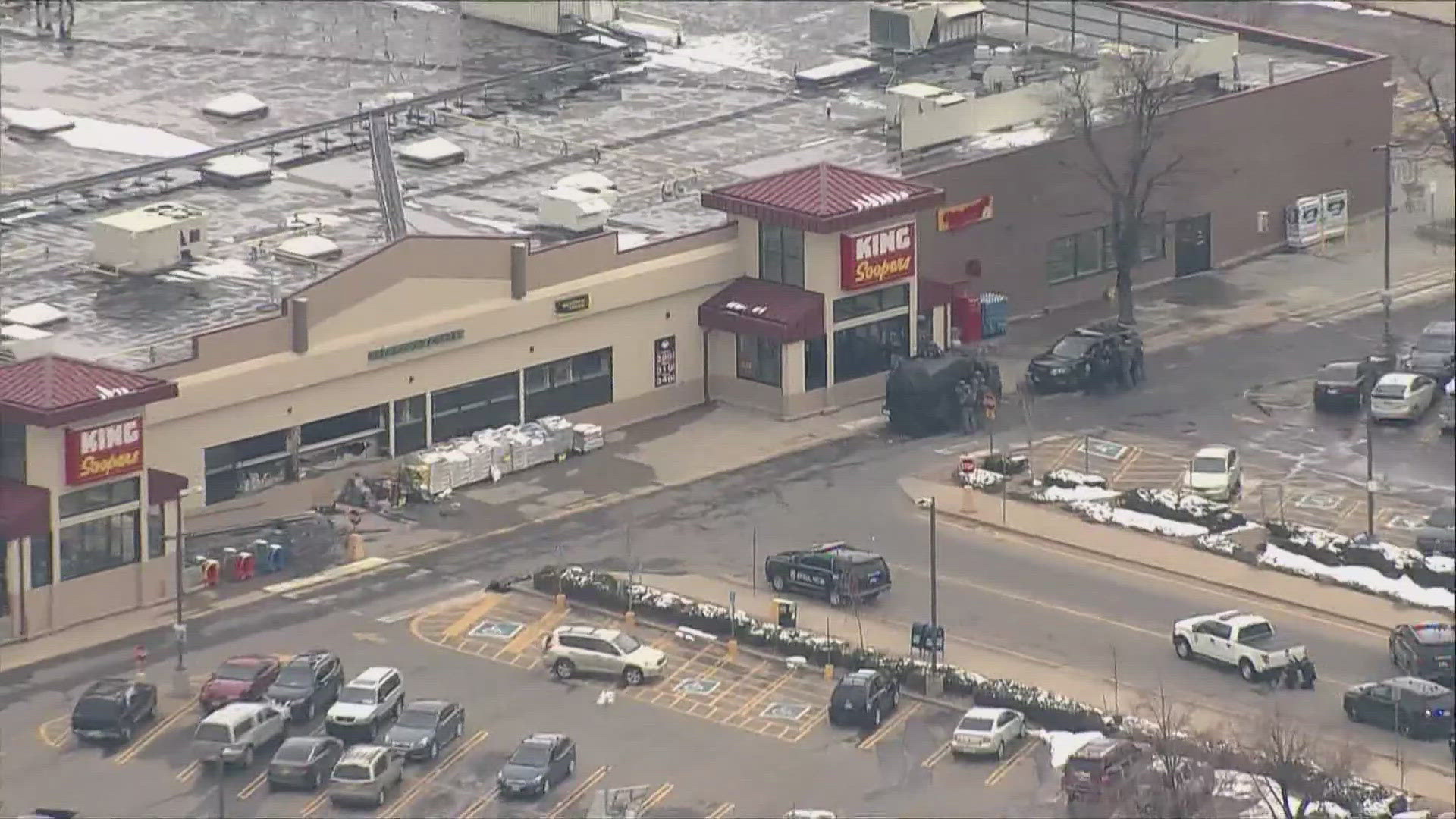BOULDER, Colo. — Family members wiped away tears in a Boulder County courtroom on Friday as prosecutors ran through each moment, each death, in the Boulder King Soopers shooting for a final time.
Now, after nearly three years, the case against the shooter is in the jury's hands.
Jurors were due in court 8 a.m. Friday for both the defense and prosecution to make their closing arguments.
Ahmad Alissa faces 10 counts of first-degree murder, 38 counts of attempted first-degree murder, one count of first-degree assault, six counts of felony possession of a prohibited large capacity magazine, and 38 crime-of-violence sentence enhancers in the March 22, 2021, shooting at King Soopers at 3600 Table Mesa Drive in Boulder.
Ten people were killed that day: Neven Stanisic, 23; Tralona Bartkowiak, 49; Denny Stong, 20; Teri Leiker, 51; Suzanne Fountain, 59; Kevin Mahoney, 61; Lynn Murray, 62; Jody Waters, 65; Rikki Olds, 25, and Boulder Police Officer Eric Talley, 51.
Defense attorneys don't dispute that the defendant, who has been diagnosed with schizophrenia, was the shooter. They have argued he is not guilty by reason of insanity, alleging that he didn't know the difference between right and wrong when he pulled the trigger.
The prosecution argued the shooter was not insane when he gunned down 10 people at the grocery store but instead that his actions were taken "after deliberation and with intent," according to Assistant District Attorney Ken Kupfner.
"You're sick. 'You're sick' does not mean 'you're insane.' Mental illness does not mean you're insane," Kupfner said during closing arguments, before describing what he called the shooter's intentional "roll of terror from west to east across the parking lot.”
Defense attorney Kathryn Herold told the jury that intent did not mean the shooter was not insane at the time of the shooting, arguing that the prosecution was discounting the severity of the gunman's mental illness.
She said in her closing statement that the prosecution is "trying to scare you. They're trying to evoke your emotions, so you don't look at what's really going on here, what was really going on that day."
"You've had a lot of emotions shoved at you, a lot of emotion pointed at you," Herold said. "When you remove that emotion, it's clear that insanity is the only explanation for this tragedy."
The prosecution emphasized the extent of the shooter's preparation, describing him as "somebody who's amassing the arsenal necessary for the attack ... so that they're going to be able to inflict as much damage as they possibly can," Kupfner said.
"Eight lives ended in 68 seconds," Kupfner said. "Without preparation, planning, practice, eight lives in 68 seconds doesn't happen. These lives were taken after deliberation and with intent."
There is no evidence that tells the jury what was going on in the shooter's brain, Herold argued. She poked holes in the prosecution's claim that because the gunman didn't kill everyone he came across in the store, he knew right from wrong.
"What we have learned is we have no idea what was going on in his head, because it was so insane at the time, because he's letting some people live and killing others," Herold told the jury. She said he heard "killing voices" in his head, psychosis brought on by his mental illness.
"This tragedy was born out of illness, not out of choice," Herold said.
Prosecutors argued that a series of choices were made ahead of the shooting.
"March 22 didn't just happen in a vacuum. He built for this, he planned for this," said Boulder District Attorney Michael Dougherty.
The prosecution argued that just because what he had done was crazy does not mean the shooter was legally insane. He referenced prior mass shootings.
"We have people all around the country who respond and go to places like Mandalay Bay in Vegas, Uvalde, Boulder. Let's shut that down, because from now on and mass shootings, we're just sending people to the state hospital because it must just be insanity," Doughtery said. "It's certainly crazy, but it doesn't mean someone's legally insane."
"There's no words to address this tragedy," Dougherty said. "There's one word that the evidence demands."
Jurors have heard from a series of witnesses over the past two weeks, from Boulder Police officers who first responded to the shooting, shooting survivors, forensic psychologists and psychiatrists, to family members of the gunman.
The jury also watched graphic surveillance and police body camera video and reviewed photos of the crime scene.
The case stalled for more than two years after multiple doctors reported that the shooter was not mentally competent to stand trial, meaning he could not understand the proceedings and assist in his own defense.
After treatment and medication, the judge ruled last fall that the man's competency had been restored.
If the jury finds him guilty of any of the murder charges, the shooter would be sentenced to spend the rest of his life in prison with no chance of parole. If he were to be found not guilty by reason of insanity, he would be committed to a mental institution and treated until he was deemed no longer a danger to himself or others.
The jury went home just before 5:30 p.m. Friday and will resume deliberations Monday.

